- Make It Yourself Lavender Heart-Shaped Bath Bombs!
- 20 Things You Never Knew About “Down There”
- 12 Best Foods For Those Suffering From Arthritis Pain
- 12 Personal Hygiene Mistakes Almost Everyone Makes (Mom Never Told You About #4!)
- 15 Medicinal Plants And Herbs From The Cherokee People
- 12 Mind-Blowing Benefits Of Drinking Coconut Water During Pregnancy
- 12 Outstanding Winter Foods That Won’t Fatten You Up Like A Christmas Turkey
6 Terrific Tips For Fighting Stomach Flu

Photo credit: bigstock.com
If you have ever had those terrible stomach pains, cramps, diarrhea, and what seems like endless bouts of vomiting, then you have had what most of us call stomach flu.
Technically, it is not a virus, but our own microbial balance that is out of whack, or some nasty bacteria that we consumed on some not-so-clean food. We become more vulnerable to these bacteria when we are outside of our normal environment, which is why it often seems to occur when we are on vacation.
Although this type of bacterial blast is usually over within 48 to 72 hours, during that time you usually feel as if you are at the edge of that long-awaited apocalypse.
The vomiting, diarrhea, cramps, and chills are simply your body’s natural response to this foreign bacteria, which it wants to get rid of in the quickest (and most disgusting) way possible.
When you get hit with a stomach bug, no matter what you want to call it, there is very little you can actually do until your body gets rid of it.
However, there are a few tips that can make you more comfortable while you are sitting on the john and waiting for this to pass.
Keep reading, so that the next time you get hit with porcelain bus driving duty, you will be better prepared to fight back.
1. Consume Anti-Inflammatories
Turmeric is the king of all anti-inflammatories. Inflammation is your body’s natural response to injury, but it also causes pain. Consuming natural anti-inflammatories, such as turmeric, can reduce your pain symptoms and speed up healing. Unfortunately, many over-the-counter anti-inflammatory drugs, such as ibuprofen, can irritate your stomach and intestines, something that you are already dealing with. Simply add ½ a teaspoon of turmeric to a half a glass of milk. If you can’t keep this down, you might want to try taking 500 mgs of a turmeric supplement twice each day.
Continue to Page 2

Photo credit: bigstock.com
2. Stay Hydrated
One of the biggest problems with gastroenteritis (which is what your doctor will call this) is dehydration. Your body is losing more fluids than you are taking in. This means you are also losing salt, minerals, and electrolytes. Stores are filled with those electrolyte-balancing drinks, but they are more sugar and artificial colors than anything else. All you really need to do to re-establish your electrolyte levels and restore mineral balance to your blood is to add a pinch of Himalayan salt to a glass of water. Himalayan salt has more than 84 essential trace minerals, plus some ionic energy that can help detoxify the body at the same time. You can make yourself a good sized batch of hydration water by adding ¼ teaspoon of Himalayan salt to 1.5 liters of water.
Continue to Page 3

Photo credit: bigstock.com
3. Tea
If you can keep down water, then you can keep down tea. Avoid black teas, sodas, or coffee, these will only upset your stomach further. Teas such as peppermint are known to calm the digestive system and stop cramps. Ginger tea is perhaps the oldest remedy on earth for stopping nausea and vomiting. Mix some raw, organic honey for sweetener and sip slowly. Your stomach will let you know if it is willing to tolerate tea or not. If it gives you the OK, then drink two or three cups each day.
4. Antibacterials
No, we don’t mean hand soap. You need to kill off those bad bacteria that somehow got in your gut. Although your body is doing it in its own way, you can help things along if you can consume some naturally antibacterial foods and herbs, such as oregano oil, garlic, coconut oil, cloves, apple cider vinegar, and thyme. Sometimes, it can be difficult to keep anything down, but a little broth with some garlic will go a long way.
Continue to Page 4

Photo credit: bigstock.com
5. Probiotics
Now that you are working on killing off the bad stuff, let’s work on adding more of the good guys to help you do that job even better. Probiotics are found in yogurt, fermented foods such as yogurt, pickles, and miso, and probiotic supplements. Try yogurt first. Don’t try the sugary, fruity stuff, just look for plain, unsweetened yogurt with active cultures. If it’s a bit sour, add a little raw, organic honey.If you can’t keep that down, try a probiotic supplement.
Probiotics keep the immune system healthy and make us less vulnerable to these types of infections in the first place. If you opt for the supplement route, look for a brand that gives you a minimum of 10 billion live cultures per serving.
Continue to Page 5

Photo credit: bigstock.com
6. What to Eat the Next 72 Hours
The first 24 hours: this might seem like the worst time to be thinking about eating anything, but you do at least need to try to keep your body hydrated. Stick to the water with Himalayan salt for 24 hours. Try to drink 3 liters, but if you can’t manage that, just do as much as your body will allow.
READ ALSO: Got Stomach Aches and Pains? We Have 12 Herbal Solutions that Work!
The second 24 hours: by now you are feeling weak as a newborn kitten, and cooking is out of the question. Even eating will feel like an effort. Try to introduce foods that are bland but that offer energy, such as toast, bananas, plain rice (perhaps rice pudding), and plain toast. If you can handle some plain yogurt, go for it. Any food that makes you nauseous simply by looking at it should be kept out of sight and out of your mouth.
The last 24 hours: chances are good that your body has expelled the nasty bug and is ready to recover. Vegetable broths are very easy on the stomach, as well as pureed vegetables, applesauce, and noodles.
The worst is over. After you get another day or two of rest, you should feel back to your old self and ready to take on the world. Perhaps you aren’t ready for another vacation, but you soon will be.
References:
































